Signs of Severe Anxiety and Coping Mechanism
Do you have a habit of getting too anxious about minor matters? Is your severe anxiety hampering the smooth functioning of your daily life? Is anxiety giving you headaches, causing insomnia and making you paranoid? All these conditions imply that you are suffering from anxiety disorder. There are several types of anxiety disorders with various symptoms, and there are effective treatment procedures for curing them as well.
Signs and symptoms of severe anxiety/ anxiety disorder: The signs of anxiety disorder vary from person to person, but one common major symptom is severe fear, tension and worry even in petty situations.
Emotional symptoms:
The common emotional symptoms except fear and tension include the following:
- Feelings of great apprehension or a dread feeling
- Problem with concentration
- Feeling overly tensed
- Always anticipating the worst in any situation
- Feeling restless and irritable
- Watching out for danger signs in everything
- Feeling mentally blank
Physical symptoms:
Anxiety is much more than being just a feeling and several physical symptoms are observed as a result of the body's response to severe anxiety. The most common physical symptoms are as follows:
- A pounding heart
- Excessive sweating
- An upset or dizzy stomach
- Enhanced urge for urination and diarrhea
- Breathing problems
- Muscle tension
- Feeling twitches and tremors
- Severe headache and excess fatigue
- Sleeplessness or insomnia
Coping with severe anxiety:
In order to cope with anxiety disorder, you should follow these tips:
- You should connect with other people as being lonely or isolated may trigger your anxiety. Meet friends or join support groups. You should share your feelings with a loved one to ease the anxiety.
- You must start undertaking relaxation techniques such as mindfulness meditation, progressive muscle relaxation or deep breathing. These help in reducing your anxiety and make you feel relaxed.
- Regular exercise and work out is a natural stress buster and relieves anxiety. Practice different types of exercises strictly every day.
- You must get sufficient sleep as lack of sleep boosts your feelings of anxiety and tension. You should get nine hours of undisturbed sleep every night.
- You should reduce your intake of alcohol and caffeine products, which worsen your anxiety.
- You must train your mind to stay calm. The habit of needless worrying must be brought under control. You can undertake strategies such as creating a worry period, challenging the thoughts of anxiety and accepting uncertainty in life.
The self-help strategies for coping with severe anxiety can be quite effective. In some cases, fear and anxiety attacks become very severe and cause great distress in a person's life. In such cases, professional help is required. Certain behavior therapies can be undertaken for eliminating severe anxiety.



+1.svg)
